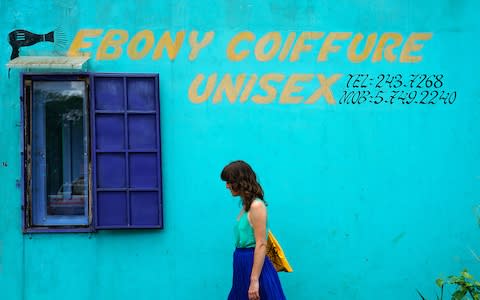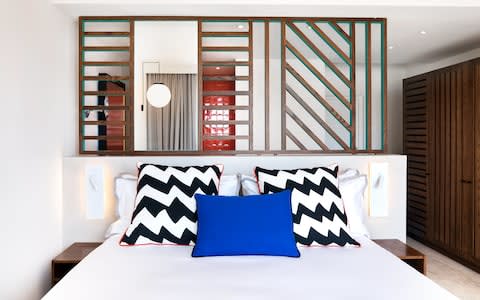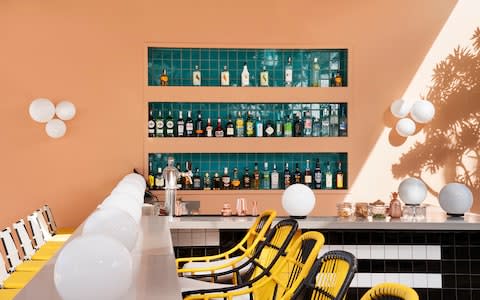Salt of the earth: Inside the Mauritius hotel where it's all about meeting the locals

I am sipping a coconut rum at the village home of Mirella, who supplies free-range chickens and eggs to my hotel in Mauritius. Her brother is singing the Mauritian sega, beating out the rhythm on a drum against his chest. Her two-year-old grandson sways to the raw lament, originally brought to the island by African slaves, and one of her nine daughters (five of them adopted) wiggles her hips as she does the washing-up. By joining a Mauritian feast with five generations of Mirella’s family, I’m experiencing a side of the island that is not normally accessible to most hotel guests. In a community-minded move, Salt of Palmar, a newly opened hotel on the island’s east coast, is one of the first hotels in recent years to encourage guests to get out to experience the island and its people.
My first visit to the east coast of Mauritius was in the Seventies, when my father was working for the British Council. I’ve returned often since then and the region has kept its traditional life, with fishing villages strung along a natural, unspoilt coastline.
Unlike most Mauritian hotels, which are keen for visitors to stay within their grounds, this small hotel with 59 rooms encourages the staff to get involved, sharing their local knowledge, and even going as far as inviting guests to family weddings. Unlike British weddings, where this may feel a little awkward, Indo-Mauritian weddings are inclusive affairs, held over four days, feeding hundreds of people, many not known directly to the bride and groom.

• Salt of Palmar, Mauritius – is this the coolest hotel in the Indian Ocean?
Walking into the hotel, I am struck by the eye-popping colour – playful splashes of emerald green, sun-yellow and electric blue, stripes and zigzags – set against a pale orange canvas. Paul Jones, Salt’s creator, is British and has lived on the island for 30 years. Camille Walala, a French artist, hadn’t designed a hotel before, but she travelled the island to soak in the blue skies, pink sunsets, green sugar cane fields and painted island houses to create an authentically local “happy place” amid the existing building’s remodelled Moroccan-style architecture.
Having visited about 50 hotels and resorts in Mauritius, I immediately notice the difference as Gloria, one of the island’s few fisherwomen, invites me to fish for crevettes (shrimps) in the river and cook them over a wood fire. Bartender Denis later takes me to the farm where he grows taro (a starchy root vegetable, the source of the hotel’s chips) in the leafy village of Clemencia. Set against the mountain is a 150-year-old Tamil temple, the island’s oldest, with its dome covered with painted deities. It was Indian immigrants, like my Mauritian stepmother, who brought salt superstitions – tossing salt over their shoulder to avert the evil eye, and using rock salt to purify their houses.
Local artisans who contributed to Salt’s creation are also keen to share their skills. Sharonne, who also happens to be the first female athlete to win a medal for Mauritius at the Indian Ocean Games, in Brazilian ju-jitsu, took me for a drive in the hotel’s Mini Cooper convertible to visit Janine at her pottery studio at Pamplemousses. She created the original grey ceramics for the hotel’s restaurant, and I discover she’s married to a descendant of an island sugar baron. In the village of Brisée Verdière, Reotee Buleeram, who has woven traditional baskets for 40 years, teaches us how to make them. She made Salt’s beach bags out of recycled plastics, in line with the hotel’s ecological ethos. Other initiatives include refillable water bottles, no buffets to cut food waste, and natural toiletries – including a heavenly handmade salt-scrub.

• The most romantic hotels for a Mauritius honeymoon
Later, sitting on a tree stump alongside passion fruit vines in Baie du Tombeau, I meet Yannick, who tells me through a translator that, during his time in prison for smoking marijuana, he created the plan for this organic garden. After a difficult start in life, his dream was realised with the help of local non-profit organisation Island Bio, which provides agricultural training to deprived communities. Sharonne explains that it will partner with the Salt Farm, opening in March, to further help change local lives.
The rooms, set around a 25m lap pool, aren’t huge but they are pleasing, with floor-to-ceiling windows, organic Carpe Diem beds and bright orange-tiled showers. Staying in one of two coveted larger top-floor “Best on the Beach” rooms with a sundeck, each morning I awoke to a fiery sunrise.
There’s no minibar (though there are goodies such as homemade taro chips, freshly roasted coffee and local moringa tea) or TV, but a Roberts radio plays a soft sega on arrival. Among shelves of books curated by local authors, I’m pleased to spot Alan Grihault’s tome, Dodo: the Bird Behind the Legend. When I mention this to the hotel staff, they say that they didn’t know he was my father, but as he’s an island resident, they have already extended an invitation for him to share his knowledge at the restaurant’s communal skill-swap table.
No other hotel on the island serves local organic food in its restaurant. As I wander through the open-plan kitchen, Jiji offers me tender slices of wild boar and venison cured sausages with fresh artisanal bread. I sample delicious breakfasts of Grandma’s Rice-Porridge (with vanilla meringue, roasted almonds, rum raisins and cinnamon), and healthy lunches of barley-smoked fish salad, vegan tacos and market fish ceviche, and try cauliflower biriani from the raw food menu.
Active days are punctuated with pampering at the Salt Equilibrium spa, which has the island’s first salt therapy room, where coloured lights seep through marbled Himalayan salt walls that release an imperceptible stress-busting vapour. At the rooftop bar, I sip a pinkish Roi (King) David, a heady mix of island rum with wild basil, frangipani flower and guava, named after the guide who has been taking visitors up Lion Mountain for 28 years.

• Incredible hotels to visit in your lifetime
On my final day, I am led down a secret path in the Black River Gorges National Park to the “End of the World” waterfall, and I am captivated by the rainbows dancing in the tumbling spray. Picnicking with my feet in a cool mountain pool, as a paille-en-queue (white-tailed tropicbird) glides above, I feel at peace with the world.
I had been sceptical about the “home-grown hotel with a huge heart”, but having cleverly harnessed the generosity of local Mauritians, I feel Salt has given the island a new pulse.
Salt of Palmar offers double rooms from £172 per night, based on two people sharing, including breakfast.
Read the full hotel review: Salt of Palmar

